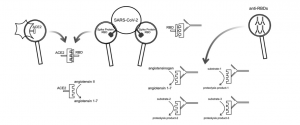Researchers have stumbled upon a surprising discovery that could hold the key to unlocking some of the mysteries surrounding COVID-19 and the lingering effects known as long COVID (Figure 1). This new understanding may pave the way for the development of more effective treatments for both the acute and long-term complications of COVID-19, potentially impacting the fight against other viruses as well.

Figure 1: Schematic diagram illustrating the hypothesis underlying the study. The SARS-CoV-2 spike protein RBD binds ACE2 on the surface of potential host cells. The RBD has a partial negative image of ACE2. Some antibodies against the RBD may then have a conformation sufficiently like ACE2 to have proteolytic activity similar to the proteolytic activity of ACE2. The hypothesis further suggests that the catalytic activity of some antibodies will have a substrate specificity like ACE2, but because the negative image of RBD present antibodies is imperfect, some antibodies with proteolytic activity will have an altered substrate specificity, potentially affecting multiple proteolytic regulatory cascades.
The study reveals that in some individuals, the body’s response to COVID-19 infection may involve the production of antibodies that mimic enzymes. Enzymes are naturally occurring proteins that play a crucial role in regulating vital bodily functions like blood pressure, blood clotting, and inflammation. While antibodies typically act to neutralize invaders like viruses, these “rogue” enzyme-mimicking antibodies, termed “abzymes,” have the potential to disrupt these critical processes.
This discovery presents an exciting opportunity for treatment development. If doctors can identify and target these abzymes, they may be able to neutralize their unwanted effects. This could be a game-changer, particularly for patients experiencing severe symptoms or long COVID with its often-debilitating and poorly understood characteristics. Rather than simply managing symptoms, doctors could potentially address the root cause by targeting the abzymes directly.
The research team sheds light on a possible explanation for the long-lasting effects of COVID-19. They hypothesize that abzymes might be responsible for some of the long COVID symptoms, particularly those related to blood clotting and inflammation. Certain systems in the body, including blood coagulation and the “complement system,” rely on enzymes to activate proteins and regulate their function. If long COVID patients produce abzymes that disrupt these enzyme functions, it could explain why these symptoms persist even after the initial infection has cleared. This theory could also hold clues for understanding rare side effects observed in some COVID-19 vaccinations.
While the initial study results are promising, further research is needed to solidify the connection between abzymes and COVID-19 complications. The researchers plan to study purified forms of these enzyme-like antibodies to understand their mechanisms in greater detail. Additionally, comparing patients who develop long COVID with those who don’t could provide valuable insights.
Journal article: Song, Y., et al. 2024. ACE-2-like enzymatic activity is associated with immunoglobulin in COVID-19 patients. mBio.
Summary by Stefan Botha










